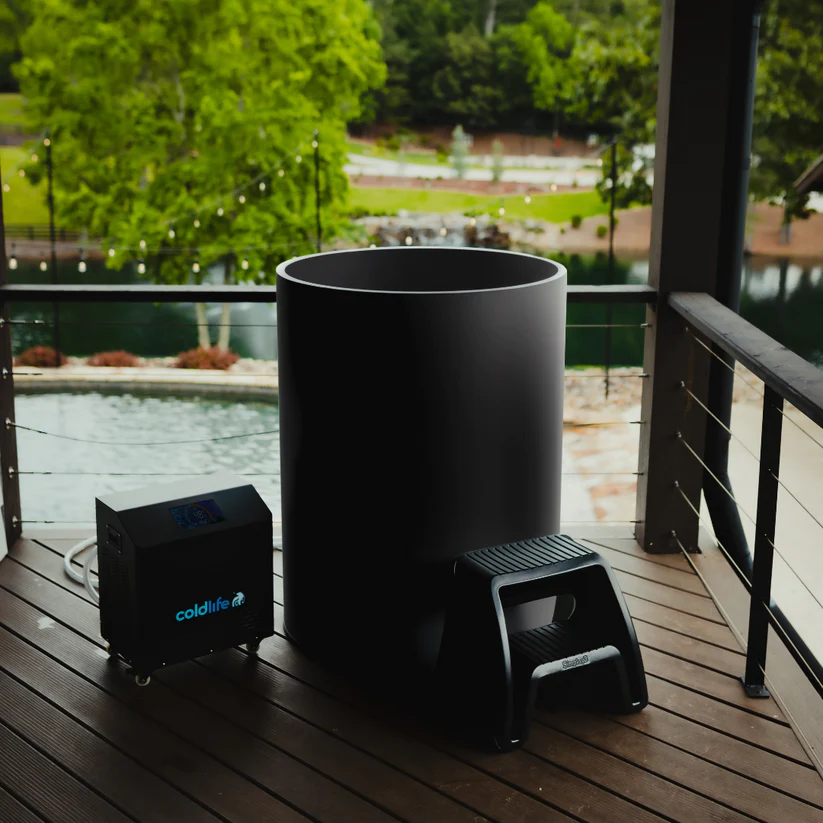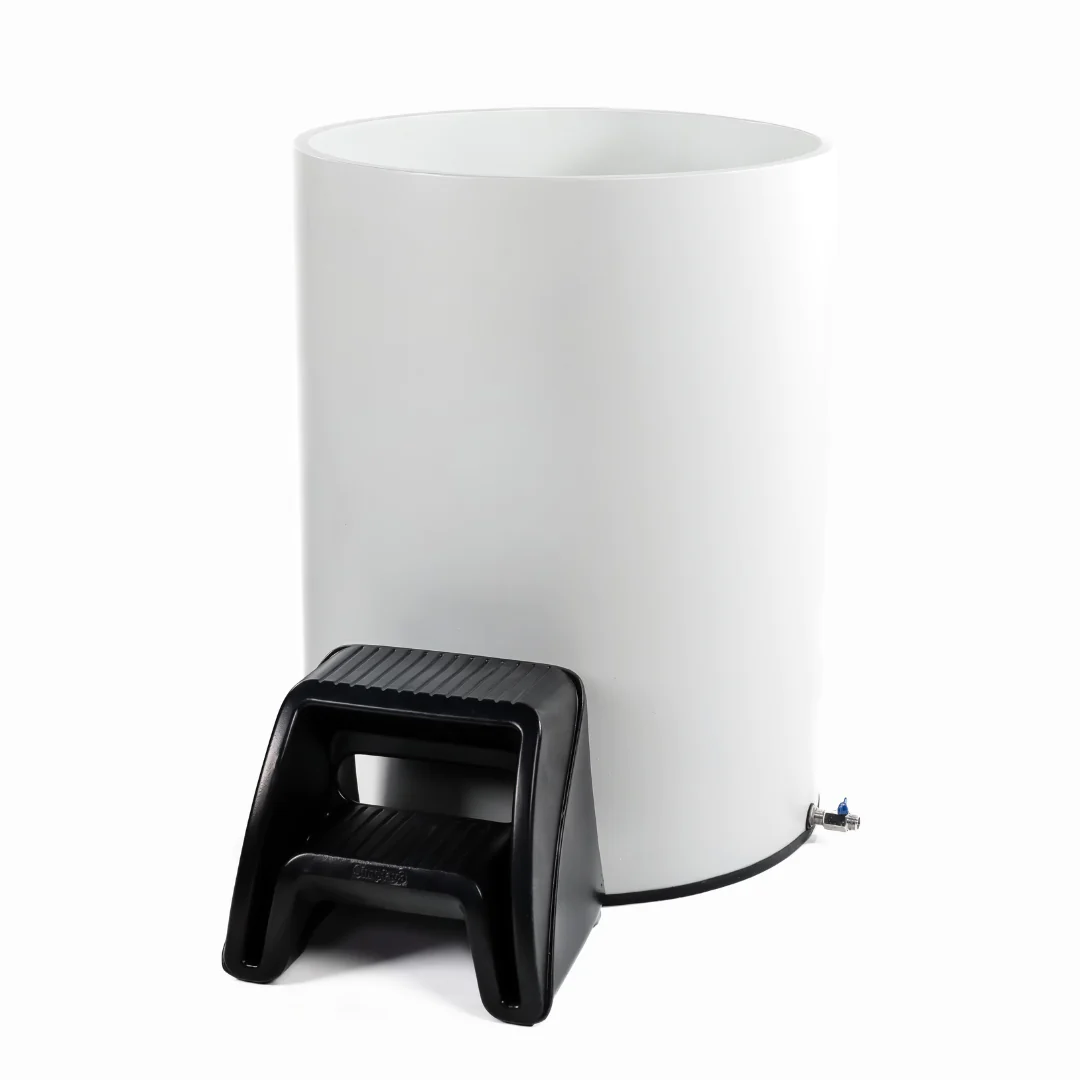Key Takeaways – Breathing Techniques for Cold Plunge
Takeaway 1: Deep breathing can help calm your mind and relax your body during a cold plunge or ice bath.
Taking slow, deep breaths before and during a cold water immersion can make a big difference in how you experience the therapy. By inhaling fully through your nose and expanding your belly, rather than your chest, you can ensure that you’re getting the most out of each breath. And when you exhale slowly through your mouth, allowing your stomach to contract, you’ll feel a sense of relaxation wash over you. Deep breathing not only helps to calm the mind but also relaxes the body, which can enhance the benefits of the therapy.Takeaway 2: Try the 4-7-8 breathing technique to enhance the effects of cold water immersion.
If you’re looking for an even more specific breathing technique to try during a cold plunge or ice bath, consider the 4-7-8 breathing method. This technique involves inhaling through your nose for four seconds, holding your breath for seven seconds, and then exhaling for eight seconds. By following this pattern of breathing, you can further promote relaxation and bring a sense of control to your body’s physiological responses.Takeaway 3: Experiment with different breathing techniques like full in-breaths with a pause or the Wim Hof Method.
In addition to deep breathing and the 4-7-8 technique, there are other methods worth exploring during cold water therapy. One approach is taking full breaths in through your nose followed by pausing before exhaling. This technique is believed to improve heart rate and circulation during a cold plunge. Another option is trying out the Wim Hof Method developed by “Iceman” Wim Hof himself. This method combines specific breathing practices with cold therapy for an even deeper connection with one’s body. Remember, it’s crucial to practice these breathing techniques before immersing yourself in an ice bath. By preparing your body and mind beforehand, you can better handle the sudden change in temperature and allow yourself to fully embrace the therapeutic benefits. So take a deep breath, practice these techniques, and let the cold water work its magic.Our #1 Best Recommended Cold Plunge
1. Discover the best ways to unwind and rejuvenate your body at our Cold Life section. 2. Embark on a journey of self-care by exploring our exclusive Cold Life strategies and products. 3. Tap into an extraordinary wellness experience with our curated selection of products in the Cold Life range.Are you ready to redefine your limits with cold immersion?
Explore the compelling truth behind cold plunging and its remarkable benefits for mind and body.
Dive into the Cold Life Plunge Bundle now to embark on your journey to revitalization and strength. Transform your life today!
Here’s a Youtube Video about Breathing Techniques for Cold Plunge
Breathing techniques for cold plunge are strategic actions that help optimize your body’s response to the extreme temperatures involved.
Whether you’re using the deep breathing technique, mastering the 4-7-8 method during immersion, or executing full in-breaths with a pause for enhanced circulation, these methods prepare your body for the cold plunge.
More advanced strategies include learning the renowned Wim Hof Method to achieve optimum wellness and preparing your body using specific exercises before an ice bath.
Finally, incorporating mindful visualization and meditation during breathing exercises can further enhance your overall experience making every cold plunge not only bearable but beneficial.

Understanding Deep Breathing Technique for Cold Plunge
Now that I think about it, deep breathing techniques during cold immersion are a powerful way to enhance the benefits of this therapy. Just imagine, before and during your cold plunge, you take slow, deep breaths through your nose – making sure both hands are in the water – and focus on expanding your belly rather than your chest. As you do so, you’ll improve cold tolerance, promoting relaxation in both mind and body.
Download this courtesy guide to optimize your sauna and cold plunge experience and health optimization.
Download the Free Guide TodayImplementing the 4-7-8 Breathing Method during Cold Water Immersion
In any case, let’s move onto our second technique – the “4-7-8 Breathing”. This breathing exercise promotes stress reduction with cold immersion by having you inhale slowly through the nose for four seconds, hold that breath for seven seconds then exuding control by exhaling smoothly for eight seconds. You see, this method not only helps prepare body for ice bath but also enhances overall wellness.Mastering Full In-Breaths with a Pause for Enhanced Circulation
We can’t forget about the “Full In-Breaths with a Pause”. This technique optimizes heart rate and circulation during a cold plunge. All things considered, opt for full breaths in through your nose followed by a brief pause before exhaling out slowly.Learning the Wim Hof Method for Optimum Wellness in Cold Plunge
By the way, have you ever tried the Wim Hof Method? Named after “Iceman” Wim Hof himself, this method combines breathing, cold therapy and commitment. It calls for starting with approximately 30 quick breaths while focusing on expanding the belly rather than chest. After which, you’re to exhale and keep your lungs empty as long as possible before reverting back to calm breathing. This is a great method not just for improving cold tolerance but also promoting overall wellness.Preparing Your Body for Ice Bath with Appropriate Breathing Techniques
Now that we’re armed with specific techniques, we should remember that proper preparation is key. Practice these deep breathing techniques well in advance of your ritualistic plunge into frigid waters and embrace the benefits of cold therapy and breath control.Incorporating Mindful Visualization and Meditation with Breathing Techniques in Cold Plunge
And lastly but certainly not least–mindful visualization or meditation. These practices paired with our discussed breathing techniques form an integral part in achieving total relaxation. This promotes greater control over body’s physiological responses especially in challenging situations like a cold plunge thereby enhancing overall experience.
Understanding the correct temperature for a cold plunge can be confusing. However, with our resources, you can make an informed decision. If you’re wondering What temperature is too cold for a cold plunge? or What temp is too cold for a cold plunge?, our expert writings can guide you in the right direction. Just remember, having the correct breathing techniques while plunging in cold water will make your experience easier and safer. Cautions and considerations when plunging into Cold Water Before that decision of taking a full-body dive into ice-cold water, make sure to understand potential risks as well. Pages such as Is a Cold Plunge Bad For Your Heart? and Are Cold Plunges Safe During Pregnancy? provide valuable insights into the potentials risks that could come along with it. Of course, with good preparation like using proper breathing techniques during a cold bath can help to avoid unwelcome scenarios. The Art of Transitioning If you love alternating between hot and cold therapies, then pages like What Happens When You Go From Sauna to Cold Plunge are certainly worth reading. Remember these cooling properties combine well with specific breathing techniques for optimal results. The Science Behind Cold Plunges Ever wondered exactly how cold plunges impact your body? Check out What Does Cold Plunge Do To Your Body for a comprehensive look at the benefits and effects of cold plunges. Remember, using correct and efficient breathing techniques in each of these scenarios will only enhance the benefits and overall experience of your cold plunge.
My Personal Take about Breathing Techniques for Cold Plunge
Hi there, my friend! I’m George, your go-to expert on everything related to saunas and cold plunges. Now that I think about it, you’ve probably come here after reading my blog post titled “Breathing Techniques for Cold Plunge: The Ultimate Guide to Boost Your Wellness.”
You see, mastering the right breathing techniques for cold plunge can unlock a world of benefits for your body and mind. With each breath, you’re enhancing circulation, boosting your immune system, and even improving mental clarity. So let’s dive in – quite literally!
In any case, if you’re not yet convinced about saunas or cold plunges – Words of Advice: give them a try! Just imagine finishing a rejuvenating sauna session and then revitalizing yourself in the cool embrace of a cold plunge. Trust me; once you experience this tension-relieving combo, there’s no going back.
- The exhilaration of alternating between hot and cold,
- The improved sleep quality,
- The feeling of tranquility post-session…
I believe everyone deserves such blissful moments every now and then. Here’s to embracing well-being with open arms!
Our #1 Best Recommended Cold Plunge for most People
Plunging into cold water has numerous health benefits, and including the right breathing techniques can significantly boost your wellness. Our Ultimate Guide on Cold Plunge provides comprehensive knowledge on how to enhance this experience. With our guide, you’ll master the perfect breathing strategies to get the most out of every cold plunge session.Discover the unparalleled benefits of cold immersion with ColdLife Plunge 1. Unleash your full potential with our innovative cold plunging solution. Explore the transformative effects on your body and mind. Elevate your lifestyle with ColdLife Plunge 1 today!
Frequently Asked Questions about Breathing Techniques for Cold Plunge
1. Can breathing techniques really enhance the benefits of a cold plunge?
Absolutely! Breathing correctly during a cold plunge can greatly enhance the benefits of the therapy. It helps calm your mind, relax your body, and improves heart rate and circulation.
2. How do I practice deep breathing during a cold plunge?
To practice deep breathing, inhale fully through your nose with both hands in the water, expanding your belly instead of your chest. Then exhale slowly through your mouth, allowing your stomach to contract. This will promote relaxation and maximize the benefits.
3. What is the 4-7-8 breathing technique?
The 4-7-8 breathing technique involves inhaling through your nose for four seconds, holding the breath for seven seconds, and then exhaling for eight seconds. This rhythmic pattern helps regulate your body’s response to the cold water immersion.
4. How can full in-breaths with a pause improve my cold plunge experience?
Taking a full breath in through your nose followed by a pause before exhaling can improve heart rate and circulation during a cold plunge. This technique helps you connect with your body and optimize its response to the therapy.
5. What is The Wim Hof Method?
The Wim Hof Method combines breathing techniques, cold therapy, and commitment to connect more deeply with one’s body during a cold plunge or ice bath experience. It involves quick breaths focusing on belly expansion followed by controlled exhalation.
6. Why should I practice these techniques before entering an ice bath?
Practicing these techniques prior to entering an ice bath prepares your body for its effects on heart rate and circulation due to sudden temperature change. It ensures that you are physically ready for maximum benefits from this therapeutic exercise.
Now you know Breathing Techniques for Cold Plunge , but that’s only the beginning of your journey here at Sweat N Chill Zone. If you found this post useful there’s more to learn to get you to the next step of your sauna & cold plunge journey. If you read our next articles you’ll be a step further than most people.
Before you go…
Takeaway 1: Deep breathing can help calm your mind and relax your body during a cold plunge or ice bath.
Taking slow, deep breaths before and during a cold water immersion can make a big difference in how you experience the therapy. By inhaling fully through your nose and expanding your belly, rather than your chest, you can ensure that you’re getting the most out of each breath. And when you exhale slowly through your mouth, allowing your stomach to contract, you’ll feel a sense of relaxation wash over you. Deep breathing not only helps to calm the mind but also relaxes the body, which can enhance the benefits of the therapy.Takeaway 2: Try the 4-7-8 breathing technique to enhance the effects of cold water immersion.
If you’re looking for an even more specific breathing technique to try during a cold plunge or ice bath, consider the 4-7-8 breathing method. This technique involves inhaling through your nose for four seconds, holding your breath for seven seconds, and then exhaling for eight seconds. By following this pattern of breathing, you can further promote relaxation and bring a sense of control to your body’s physiological responses.Takeaway 3: Experiment with different breathing techniques like full in-breaths with a pause or the Wim Hof Method.
In addition to deep breathing and the 4-7-8 technique, there are other methods worth exploring during cold water therapy. One approach is taking full breaths in through your nose followed by pausing before exhaling. This technique is believed to improve heart rate and circulation during a cold plunge. Another option is trying out the Wim Hof Method developed by “Iceman” Wim Hof himself. This method combines specific breathing practices with cold therapy for an even deeper connection with one’s body. Remember, it’s crucial to practice these breathing techniques before immersing yourself in an ice bath. By preparing your body and mind beforehand, you can better handle the sudden change in temperature and allow yourself to fully embrace the therapeutic benefits. So take a deep breath, practice these techniques, and let the cold water work its magic. Ever wondered about what happens when you take a cold plunge? Find out the ideal temperature for a cold water plunge and the best methods to cold plunge. Once well-informed, you can then explore options for the most affordable cold plunges available in the market.George From Sweat N Chill Zone
George, the passionate founder of Sweat N Chill Zone, is an ardent advocate for holistic wellness through the healing powers of saunas and cold plunges. With a background in health sciences and a fervent dedication to sharing the benefits of thermal therapy, George curates an informative space, offering insights, tips, and expert advice to help individuals optimize their health and well-being through the transformative effects of heat and cold treatments. Through Sweat N Chill Zone, George aims to inspire and educate, fostering a community centered around rejuvenation and vitality.
Download this courtesy guide to optimize your sauna and cold plunge experience and health optimization.
Download the Free Guide Today

